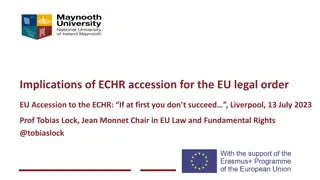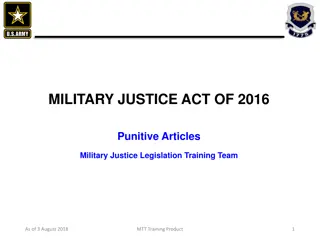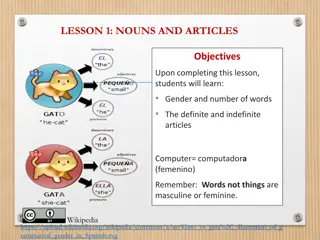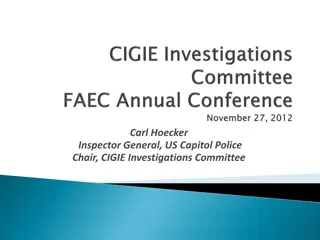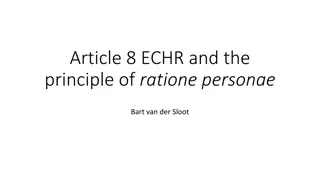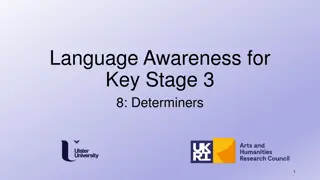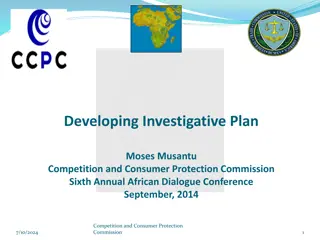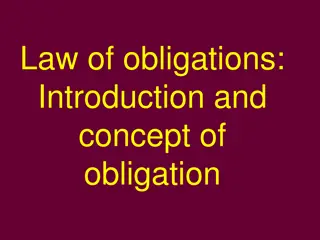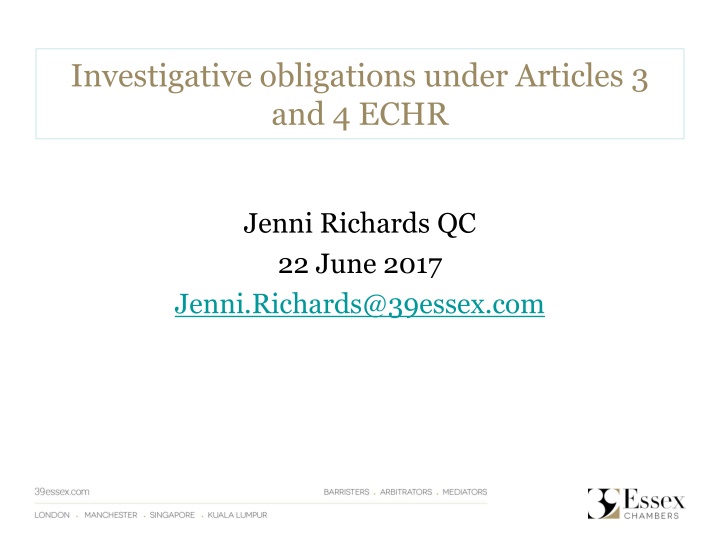
Investigative Obligations Under Articles 3 and 4 ECHR by Jenni Richards QC
Explore the investigative obligations under Articles 3 and 4 of the European Convention on Human Rights (ECHR) as discussed by Jenni Richards QC. The analysis includes case references and the duty for effective investigations in cases of alleged ill-treatment by both state and non-state actors.
Download Presentation

Please find below an Image/Link to download the presentation.
The content on the website is provided AS IS for your information and personal use only. It may not be sold, licensed, or shared on other websites without obtaining consent from the author. If you encounter any issues during the download, it is possible that the publisher has removed the file from their server.
You are allowed to download the files provided on this website for personal or commercial use, subject to the condition that they are used lawfully. All files are the property of their respective owners.
The content on the website is provided AS IS for your information and personal use only. It may not be sold, licensed, or shared on other websites without obtaining consent from the author.
E N D
Presentation Transcript
Investigative obligations under Articles 3 and 4 ECHR Jenni Richards QC 22 June 2017 Jenni.Richards@39essex.com
Article 3 No one shall be subjected to torture or to inhuman or degrading treatment or punishment. An investigative obligations analogous to that arising under article 2 is now well-established in ECtHR case-law
The black cab rapist case DSD v Commissioner of Police for the Metropolis DSD v Commissioner of Police for the Metropolis [2016] QB 161, [2015] EWCA Civ 646 (appeal heard by the SC in March 2017, judgment awaited) The Court of Appeal: Rejected the argument that the duty to investigate allegations of inhuman or degrading treatment springs only from article 1 ECHR and not from article 3 (the result of which would have been that there was no duty cognizable in English law to investigate alleged substantive breaches of article 3) Rejected the argument that the duty to investigate only arises where a public authority is complicit in an alleged substantive breach of article 3
The DSD case Per Laws LJ at [11]: The restrictive reading which the MPS would attribute to article 3 allows no real weight to be given to what may be thought of as fundamentals of a civilised constitution: the rule of law, and the security and protection of the people. There is a clear and consistent line of Strasbourg authority to the effect that a positive obligation to conduct an effective investigation is not limited solely to cases of ill-treatment by state agents The duty to conduct an effective official investigation into alleged ill- treatment by private individuals is inherent in article 3 Whilst ill-treatment by a non-stage agent does not of itself constitute a breach of article 3, the ECtHR has interpreted article 3 to provide safeguards that are broader than the bare prohibition of acts of torture or ill-treatment by servants of the state
The DSD case The idea at the core of the article is that of safeguarding or protection in all the myriad situations where individuals may be exposed to ill-treatment of the gravity which the article contemplates. There is perhaps a sliding scale: from deliberate torture by state officials to the consequences of negligence by non- state agents. The energy required of the state to combat or redress these ills is no doubt variable but the same protective principle is always at the root of it. The margin of appreciation enjoyed by the state as to the means of compliance with article 3 widens at the bottom of the scale but narrows at the top. At what may, without belittling the victims, be called the lower end of the scale where injury happens through the negligence of non-state agents, the state s provision of a judicial system of civil remedies will often suffice Serious violent crime by non-state agents is of a different order: higher up the scale. In these cases a proper criminal investigation by the state is required. [per Laws LJ at 44-45]
The DSD case The nature, scope and rigour of the investigative exercise do not in principle shift as between articles 2 and 3 (although there may be practical differences, e.g. that in an article 3 case the victim may be able to give his own account) There is no general principle that the investigative obligation is less extensive in a non-state agent case. Whilst the requirements of independence and transparency will be especially pressing where there is a serious case that state agents have killed or injured, in the end these factors are driven by the exigencies of the particular case . The fact that an offender is in the end apprehended, prosecuted and convicted (as with Worboys) does not necessarily demonstrate that there has been an effective investigation.
The DSD case What is a proper (Laws LJ) or effective (ECtHR) investigation? Compliance with the article 3 duty is first and foremost concerned, not with the effect on the claimant, but with the overall nature of the investigative steps to be taken by the state. The police must be accorded a broad margin of appreciation in the choice of means of investigation. Failure to adhere to internal standards and procedures does not itself give rise to a breach of article 3 but may be relevant The judge was right to find that there was a violation of article 3 in light of the multiple systemic and operational failures that he found.
The DSD case The systemic failures included: failures in training, supervision, management, use of intelligence sources, lack of proper systems to ensure victim confidence and failure to allocate adequate resources The operational failures included: failure of front desk staff to record relevant facts; failure to interview relevant witnesses; failure to collect relevant CCTV evidence; failure to believe D or take her complaint seriously; failure to conduct proper searches; failure to conduct proper interviews of Worboys; failure to follow up CCTV evidence; failure to record incident as serious sexual offence.
Al-Saadoon R(Al R(Al- -Saadoon Saadoon) v Secretary of State for Defence ) v Secretary of State for Defence [2016] EWCA Civ 811: Court of Appeal s decision on the scope of the state s duty to investigate allegations of wrongdoing outside its territory Although (see Soering Soering v UK v UK) article 3 gave rise to an obligation not to send an individual to another state where there were substantial grounds for believing he would face a real risk of torture or inhuman or degrading treatment, that did not mean that an investigative obligation arose in such cases and there was no reason in principle why such an obligation should be considered necessary to give effect to article 3: the investigative duty under article 3 is a duty to investigate a credible claim of ill-treatment with a view to identifying and punishing those responsible, not a duty to investigate the conduct of state officials in exposing the individuals to the risk of ill-treatment
Al-Saadoon The Court rejected the claimants argument that there was a duty to investigate any arguable breach of article 3 There were two situations in which the investigative duty would arise: Where the individual was tortured or mistreated by another state, under the direction of or at the instigation of the state which handed him over Where the state which handed over the detainee had a sufficient level of involvement in the subsequent mistreatment to amount to complicity The Court also considered whether article 5 gave rise to an investigative obligation and held that it did not arise in all cases of detention which arguably breached article 5. The investigative duty was limited to cases of enforced disappearance, namely where a deprivation of liberty took place outside the protection of the law and the state responsible refused to acknowledge the detention.
Recent Strasbourg cases Talpis Talpis v Italy prosecution for domestic violence and delay in conduct of criminal proceedings v Italy (2.3.17): breach of article 3 due to inertia in instigating criminal Skorjanec Skorjanec v Croatia conjunction with article 14 due to failure to identify the violence against the applicant as a suspected hate crime. Authorities failed properly to consider the possibility that S had been the victim of a hate crime, or to investigate whether a hate crime had been committed against her. Irreconcilable with the state s obligation of taking all reasonable steps to unmask the role of racist motives in the incident. v Croatia (28.3.17): violation of investigative duty in article 3 in
Recent Strasbourg cases Tanase Tanase v Romania v Romania (19.5.17): complaint of failure to conduct effective and timely criminal investigation into responsibility for a road traffic accident which left the applicant with serious injuries. Applicant argues that the investigation lacked promptness, was ineffective and that the authorities failed to examine the merits of the case. Chamber has relinquished jurisdiction in favour of the Grand Chamber. Sakir Sakir v Greece v Greece (24.3.16): failure to investigate the assault on the applicant with the requisite level of diligence and effectiveness. Police failed to take a statement from the applicant, or invite him to identify potential assailants; failed to establish in detail the nature and cause of his injuries e.g. by obtaining a forensic medical report; failed to question all relevant witnesses; failed to take the general context of racial violence in Athens into account
Article 4 1. No one shall be held in slavery or servitude. 2. No one shall be required to perform forced or compulsory labour. The ECtHR has held that trafficking falls within the scope of article 4.
The investigative obligation under Article 4 Article 4 imposes a positive, procedural duty to investigate where there is a credible suspicion that an individual s rights under Article 4 have been violated Rantsev Rantsev v Cyprus and Russia v Cyprus and Russia (2010) 51 EHRR 1 CN v United Kingdom CN v United Kingdom (2013) 56 EHRR 24
Rantsev v Cyprus & Russia Applicant s daughter R was a Russian national who arrived in Cyprus and was granted permit to work as an artiste in a cabaret managed by MA. MA was informed that R had left the apartment where she was living with other women and had left a note saying she wanted to return to Russia. MA found and apprehended R and took her to the police station. The police decided that she could be collected by her employer. MA collected her, took her to the apartment of another employee and placed her in a second floor room. Shortly afterwards she was found dead in the street below the apartment.
The application in Rantsev A complained under articles 2, 3,4, 5 and 8 about the lack of sufficient investigation by the Cypriot authorities into his daughter s death, the lack of adequate protection of his daughter by the Cypriot police while she was alive and the failure of the Cypriot authorities to take steps to punish those responsible for her death and ill-treatment A complained under articles 2 and 4 about the failure of the Russian authorities to investigate his daughter s alleged trafficking and subsequent death and to take steps to protect her from the risk of trafficking
Rantsev: the Courts findings Court held that: There had been no violation of the Cypriot Government s positive obligation to protect life under article 2 There had been a procedural violation of article 2 by Cyprus because of the failure to conduct an effective investigation into R s death There had been a violation of article 4 by Cyprus because of the failure to afford R practical and effective protection against trafficking and exploitation in general and specific measures of protection There was no violation by Russia of its positive obligations under article 4 to take operational measures to protect R But there had been a violation by Russia of its procedural obligation under article 4 to investigate the alleged trafficking
Rantsev: the courts findings Insofar as the procedural duty under article 2 was concerned, the absence of evidence that R died as a direct result of the use of force did not preclude the existence of the article 2 investigative obligation The procedural duty to investigate arose here because of: the ambiguous and unexplained circumstances surrounding her death and the allegations of trafficking, ill-treatment and unlawful detention in the period leading up to her death
Breach of article 2 investigative duty Although the police arrived quickly, undertook a forensic examination and took statements, there were 6 elements of the investigation which were unsatisfactory: (1) there was conflicting testimony, inconsistencies in the evidence and anomalies, which the investigation took no steps to resolve; (2) at the inquest no effort was made to question those who lived or worked with R or to establish why she was trying to escape or whether she had been detained against her will (3) apart from some initial statements, there was no investigation into what had occurred at the police station and in particular why the police handed R to MA or why no statement was taken from R (4) the applicant was not personally advised of the date of the inquest, was not present when the verdict was handed down and was only advised of the inquest finding some 15 months later: there was an absence of effective participation (5) A s continued requests for investigation and for information about further remedies open to him within the Cypriot legal system went unheeded (6) Cyprus failed to seek any assistance from Russia in investigating the circumstances of R s stay in Cyprus and obtaining further evidence
Positive obligations imposed by Article 4 Article 4: Requires the state to have a legal or regulatory framework which includes safeguards adequate to ensure the practical and effective protection of the rights of victims or potential victims of trafficking (including criminal law measures to prohibit and punish trafficking and measures regulating businesses) May require the state to take operational measures to protect victims or potential victims: test is whether the authorities were or ought to have been aware of circumstances giving rise to a credible suspicion that an identified individual had been or was at real and immediate risk of being trafficked or exploited
The investigative duty under Article 4 Article 4 also imposes a procedural obligation to investigate situations of potential trafficking The requirement to investigate does not depend on a complaint from the victim or a relative authorities must act of their own motion authorities must act of their own motion once the matter has come to their attention The investigation must be independent independent from those implicated in the events The investigation must be capable of leading to the identification and capable of leading to the identification and punishment of those responsible punishment of those responsible There is a requirement of promptness and reasonable expedition promptness and reasonable expedition in all cases Where the possibility of removing the victim from the harmful situation is available, the investigation must be undertaken as a matter of urgency The victim or next of kin must be involved victim or next of kin must be involved in the procedure to the extent necessary to safeguard their legitimate interests
The investigative duty under Article 4 In trafficking cases, there is, in addition to the obligation to conduct a domestic investigation into events occurring on their own territories, a duty in cross-border trafficking cases to co-operate effectively with the relevant authorities of other states concerned in the investigation of events which occurred outside their territories There was a breach by Russia: no investigation of the possibility that agents or networks in Russia were involved in trafficking R to Cyprus; no investigation into how or where she was recruited; no steps taken to identify those involved in her recruitment or the methods used
CN v United Kingdom CN came to the UK from Uganda, using a false passport and visa obtained by a relative S On arrival the documents were taken from her by S and she was told not to talk to anyone She worked as a carer and security guard for M, who was introduced to her by S Wages were paid to S and never passed onto her Went to a local bank, asked them to call the police and collapsed CN s solicitor asked police to investigate and consider prosecutions Police informed CN that there was no offence in English law to cover the facts of the case and accepted that not every line of enquiry had been pursued due to limited resources
CN v United Kingdom The ECtHR applied Rantsev procedural obligation to investigate arises where there is a credible suspicion that an individual s rights under article 4 have been violated For an obligation to have existed, the applicant s complaints must have given rise to a credible suspicion that she had been held in domestic servitude Her complaints were not inherently implausible, did give rise to a credible suspicion and placed the domestic authorities under an obligation to investigate The criminal law in force at the time did not afford practical and effective protection against treatment falling within article 4 because the authorities were limited to investigating criminal offences (e.g. assault, blackmail) that often but do not necessarily accompany the offences of slavery, servitude and forced labour
CN v United Kingdom Although there was an investigation, that investigation focused on trafficking for exploitation rather than domestic servitude A thorough investigation into complaints of such conduct requires an understanding of the many subtle ways an individual can fall under the control of another there was none Further no attempt was made to interview S despite the gravity of the allegations against him No weight was given during the investigation to her allegations that her passport had been removed, wages had not been paid to her and that she was explicitly and implicitly threatened with denunciation to the immigration authorities
The OOO case OOO OOO v v Commissioner Commissioner of of Police (Wyn Williams J) Claimants were young Nigerian women who had been brought into the UK illegally and alleged that over a number of years they were made to work for no pay in households in London and subjected to physical and emotional abuse by the householders Held, applying Rantsev, that the police were under a duty to carry out an effective investigation of an allegation amounting to breach of article 4 once a credible account of an alleged infringement had been brought to their attention The duty to investigate in any individual case may have to take account of priorities and resources decisions about the manner, scope or timing of an investigation may be informed by resources and/or priorities as between different investigations Police for for the the Metropolis Metropolis [2011] EWHC 1246
The OOO case Duty is not triggered only when there is a complaint from an alleged victim The fact that no victim is identified may be a factor for police to consider, may be relevant to the credibility of the complaint or the issue of priorities, or may make an investigation difficult to mount in practice but does not preclude the duty from arising as a matter of principle Held that the failure of the police over a period of time to investigate the treatment which had been meted out to them was a breach of article 4. The duty was first triggered by a meeting at Hackney Law Centre with the police involving a number of young women (not including the Claimants themselves at that stage) Damages of 5000 awarded to each Claimant
Recent cases Chowdury Chowdury v v Greece force labour. Recruited to pick strawberries but were not paid their wages and were forced to work in difficult physical conditions under the supervision of armed guards. workers to the Greek authorities was dismissed on the basis that had they really been victims they would have reported the matter to the police earlier. ECtHR ECtHR held held that by omitting to investigate whether their allegations were well-founded and by dismissing their request on the ground of delay, there was a violation of the duty to conduct an effective investigation. Other complaints had led to prosecution but the defendants were acquitted on the basis that the workers were free to leave their jobs: this was a violation of the obligation of effective investigation, as was the failure to provide for a right to obtain compensation. Greece (30.3.17): 42 Bangladeshi nationals subjected to The complaint of some of the
Recent cases J J v v Austria Austria (17.1.17) at 107: triggered as soon as a matter has come to the attention of the authorities; the investigation must fulfil the requirements of independence and impartiality, promptness promptness and and reasonable reasonable expedition there is a possibility of removing the individual concerned from a harmful situation. The investigation must also be capable of leading to the identification and punishment of the individuals responsible an obligation concerning the means to be employed, and not the results to be achieved In In addition, addition, authorities authorities must must take take all all reasonable to to secure secure evidence evidence concerning concerning the the incident obligation must not be interpreted in such a way as to impose an impossible or disproportionate burden on the authorities. On the facts: no breach of the investigative obligation On the facts: no breach of the investigative obligation. the positive obligation to investigate is expedition, and urgency where reasonable steps incident Finally, the positive steps available available to to them them
Recent cases LE LE v v Greece Greece (21.1.16): Nigerian national who on arrival in Greece in 2004 had her passport confiscated by KA and was forced to work as a prostitute. In November 2006 she filed a complaint against KA and his spouse DJ. DJ DJ was prosecuted and acquitted. ECtHR held that the court could not be accused of issuing an arbitrary or insufficiently reasoned judgment entailing a breach of the procedural obligation (but inferentially, an arbitrary or insufficiently reasoned judgment could found a breach of the investigative duty).Police had reacted promptly to LE s complaint and completed an initial investigation in due time, but a number of aspects were unsatisfactory: prosecutor initially rejected the complaint; following receipt of supporting statement from an NGO the authorities did not resume examination of the complaint on their own motion; there was a 5 month period of inactivity and other delays; insufficient efforts were made to locate KA.
39 Essex Chambers LLP is a governance and holding entity and a limited liability partnership registered in England and Wales (registered number 0C360005) with its registered office at 81 Chancery Lane, London WC2A 1DD. 39 Essex Chambers members provide legal and advocacy services as independent, self-employed barristers and no entity connected with 39 Essex Chambers provides any legal services. 39 Essex Chambers (Services) Limited manages the administrative, operational and support functions of Chambers and is a company incorporated in England and Wales (company number 7385894) with its registered office at 81 Chancery Lane, London WC2A 1DD.



